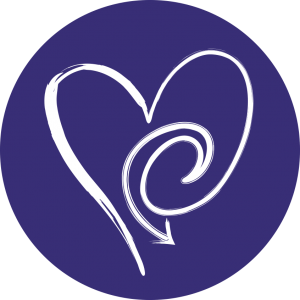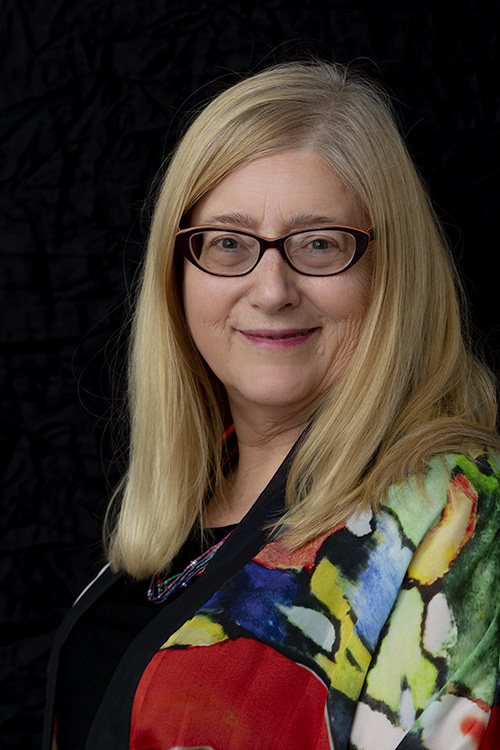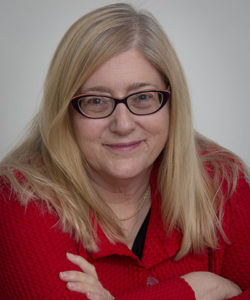Had to Get this Off My Chest.
I can picture her white uniform, and the cap from her Chicago nursing school pinned to her dark, curly hair. The year is 1953. She is 27, a floor nurse at Scripps Hospital in La Jolla. She’s in motion all day, bringing medications, lifting and turning patients. She is also newly pregnant for the first time. On a break she stops at the ladies’ room and realizes she is spotting. She quits her job effective that day and goes straight to the office of her obstetrician.
“Just spotting so far,” he says. “But if you miscarry, you can always have another baby.”
“I want this baby,” she says.
“Then let’s give you an injection of diethylstilbesterol to lower the risk of pregnancy loss.”
Back then, DES, a synthetic estrogen variant, was the standard of care for women at risk of miscarriage. Only later was it shown that DES did not in fact protect against pregnancy loss.
And that is how I became a DES Daughter, a female exposed to diethylstilbesterol in utero. It turns out DES Daughters are at increased risk for several health conditions including breast cancer.
Seven decades later, faced with a second breast cancer within a year, I searched for reasons and wondered if DES could be the cause. Or was it because I used systemic HRT, which is still controversial for breast cancer survivors? Or was it the botched biopsy by a medical student before my first cancer surgery, that may have seeded cancer cells in that breast? Genetic testing for known cancer-causing mutations came back negative. Was it a combination of factors? Or just the luck of the draw? I will never know.
Off My Chest
After the second diagnosis I eventually stopped looking for causes and focused on the body I have, regardless of how I got here. I met with a competent surgeon who recommended mastectomy this time. I agreed. Then she began talking up breast reconstruction. Maybe it was my mood, but I found that idea no more appealing than if someone had proposed making me a fake uterus out of ground beef after my hysterectomy ten years ago.
I don’t mean to diss anyone who decides on reconstruction; after all, I’m the woman who wrote “Let She Who Grows her Chin Hairs Cast the First Stone,” about supporting each other’s bodily choices. But after reading the account of a woman who underwent an extra nine hours of surgery after the vasculature in her tummy-fat-turned-fake-breasts failed, I was clear that for me, the less intervention the better.
And then, of course, my attitude about reconstruction is shaped by knowing people who have chosen top surgery. Getting rid of their breasts was the point. Not only trans people; I have a female writer acquaintance who simply did not like having breasts and got rid of them.
The night before my surgery was also the eve of my 72nd birthday. My daughter and her family arrived with cake and balloons and sang me Happy Birthday, along with my partner. It was lovely, the best possible distraction.
When the journalist Barbara Ehrenreich went through breast cancer, she was fascinated and repulsed by breast cancer culture. She practically gagged whenever she saw one of those twisted pink ribbons. I get it. When I was admitted for surgery, everywhere I turned somebody was pressing into my hands another little pink pillow made by a survivor. I have a whole bag of the stuff in my office. Shall I give them back? Or light a bonfire in the yard?
Let me die of anything but suffocation by the pink sticky sentiment embodied in that teddy bear. —Barbara Ehrenreich
When I got to the operating room I requested they sing me Happy Birthday, but the anesthesia hit seconds later. That night in the hospital I could barely get out of bed. The nurse asked me if I used a walker at home. “No,” was all I said. I did not have the energy to tell her I am a gym rat or give the standard lecture about ageism.
By the next day I was ready to blow that popsicle stand. But I had a vacuum machine attached to my chest that was supposed to promote healing, and the unit they wanted to send home was not working. Finally a replacement solved that issue and home I went, a big purple sponge on my chest attached by a three foot tube to a little vacuum that farted every ten seconds, all day and night. Lying in my own bed that night holding hands with my sleeping beloved was bliss. I was done and home, whispering to myself a Medieval poem I learned in English class half a century ago.
O Western wind When wilt thou blow And the small rain down can rain Would that my love were in my arms And I in my bed again.
It is one thing to decide you are a crone who does not give a shit about how people see you; it’s quite another to see your own chest for the first time minus a breast. Ten days later when the vacuum and the sponge came off, there it was. I had pictured that side of my chest as a flat surface, a sort of canvas. I had pondered a tattoo, maybe a spiral. The reality turned out to look more like a deflated balloon.
But I recovered, day by day, and counted my blessings. I’ve now said goodbye to a few unneeded body parts (one secret of happiness in later life, according to Nora Ephron). But I have friends my age who have had to say goodbye to their whole bodies, to everyone and everything they ever loved. And I’m still here, with books to write.
A few days ago I got a card from the operating room staff wishing me a good recovery and telling me they played birthday songs on the OR stereo while I was asleep.
And just after surgery I got word that my new book, Rock On: Power, Sex and Money after 60, was shortlisted for the Nonfiction award from Advantages of Age. If all goes well, eight weeks after mastectomy I will be in London for the award ceremony. Award or not, I’ve already won.
I’m alive.
Rock On, indeed.



25 Responses
And here you are – back home again and leaving us all awestruck by your bravery and resilience. You are an amazing woman, Stella. Your family must be so proud of you. Like everyone else, I’m pulling for you to go to the London ceremony and win that award! Hugs from Australia.
Thanks Kisane! Fingers crossed, we’re scheduled to leave on Monday!
Cheers!
Stella, you are fearless and your fearlessness is beautiful.
Heart with you.
Thank you, Joan!
(I have plenty of fear, but fear doesn’t get us to the next step, does it?)
Cheers,
Stella
Stella, glad you’re okay and you powered through surgery (perhaps “power” isn’t accurate for your body, only your mind!) We need your voice!
Thanks, Melinda!
Thinking of all the women in places like Sudan and Gaza with early stage breast cancer, unlikely to be detected until much later. We need their voices too.
All the best,
Stella
Thanks Melinda! And the “deflated balloon” of this article became the seroma of “When Zebras Meet” in a later essay. The human body is complex!
Stella: You are indomitable and empowering!! For everyone reading this comment: know that Stella while recovering, managed to get my interview posted. PONDER THAT!!!
And like Stella, I had a hard time after my two breast cancers dealing with all the ‘pink survivor’ …
Sorry folks, I’m 80 and have both past and present experiences of how the medical profession has treated health care based on the male body.
Back to you, Stella.
Your skills, integrity, and exuberance for life are a blessing!! I learned more from you about writing an essay than I ever did from my ‘BS (Bull Shit), MS (More of the Same), and PhD (Piled Higher and Deeper).
Mountains and oceans of LOVE!! And you know ‘my definition’ for love as a verb.
Carol
Thanks so much for your kind words, Carol! And so glad we got to publish your essay!
Cheers,
Stella
Thanks for sharing the truth with no varnish. So many of us can identify with you. Faced with your situation, I would have made the same choice not to have a reconstruction. Brava and congratulations on the potential award. I see London in your future!
Thank you, Mirinda! I so much appreciate this, coming from someone who is in the midst of her own health challenges. Onward!
Cheers,
Stella
Wow Stella! You have taken a trauma and processed it into deep meaningful writing! Thanks for your openness and courage. Rock on!
Thanks so much, Joann! We are in the business of making lemonade!
Cheers,
Stella
You’ve been on mind since you wrote about your upcoming surgery – glad it went well and that you’re on the road to recovery. I wish you all the best and look forward to reading many more of your books in the future.
Thanks Barb! And I hope your writing is going great!
Cheers,
Stella
Very powerful article, Stella. I am pulling for you to get to that ceremony for a much deserved award.
Many thanks, Lise! Fingers crossed!
I’m profoundly moved by this personal essay, Stella. It should be required reading, not just for breast cancer survivors, but for all of us. I admire you tremendously and I’m grateful to you for sharing this very personal and emotional experience.
Thank you, Joan! You know you and I have a Mutual Admiration Society. Here’s to good health for both of us (and all of us)!
Brave! You define the word by “not giving a shit.” Thank you for being a role model for all of us.
Many thanks, Wendy! Being a crone has more good news than bad!
Stella, you’ve been on my mind and in my prayers since we last connected.
I’m halfway through reading Rock On and it’s terrific! I talked my husband’s face off one afternoon after reading chapter 18 – Fear Sells. 😂 He was astounded by some of the information I unloaded on him.
Congratulations on the well deserved honor for your book. I can already see you in London accepting the award.
Continuing to send you healing vibes.
Thank you, Yvonne! I like the visualizing idea – will try it too!
Cheers!
Hooray! Your body, your choice. Your success. I remember with my two-types-of-cancer-at-the-same-time, when well-meaning acquaintances said, “You’re so spiritual. Why don’t you just envision those cancers away?”—and my thinking, “envision aggressive ovarian cancer away? I’m not that stupid.” My body, my choice. That was 25 years ago. My choices, my LIFE.
PS: I learned that poem in college with a different 4th line: “Christ, that my love were in my arms.” Which is correct, we’ll never know, as the source is that Very Famous Author, “anon.” But I like yours better.
Oh my goodness, Natalie! 25 years past ovarian cancer! Wonderful!
And, yes, there are many versions of that poem – I just picked my fave.
Cheers,
Stella